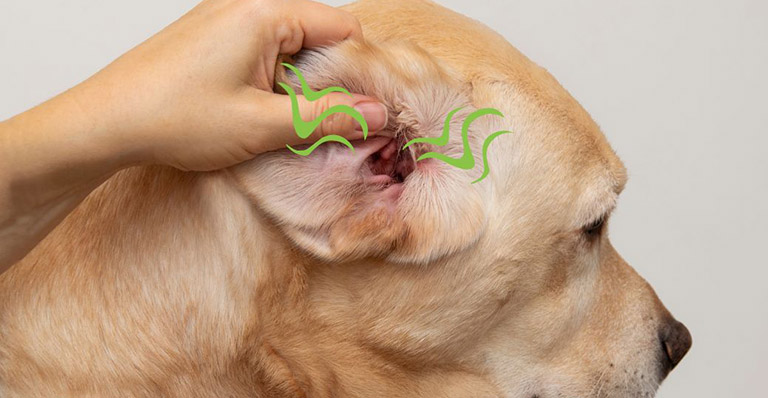Smelly ears in dogs aren’t just a minor annoyance—they could be signaling a deeper problem that needs immediate attention. From wax buildup to infections, your dog’s ear odor might be a clue that something’s wrong. But what’s really causing that smell? In this blog, we’ll uncover the hidden reasons behind stinky ears, highlight the breeds most at risk, and share essential tips for keeping your dog’s ears fresh and healthy. Plus, learn when it’s time to stop cleaning and call the vet before a small issue turns into a big problem.
Causes of Smelly Ears in Dogs
There are several potential reasons your dog’s ears might smell, ranging from mild to serious issues. Here are some common causes:
1. Dog Ear Infections
Harmful bacteria or yeast can lead to ear infections, often accompanied by symptoms such as discharge, redness and constant scratching. If left untreated, infections can worsen, making early detection and care essential.
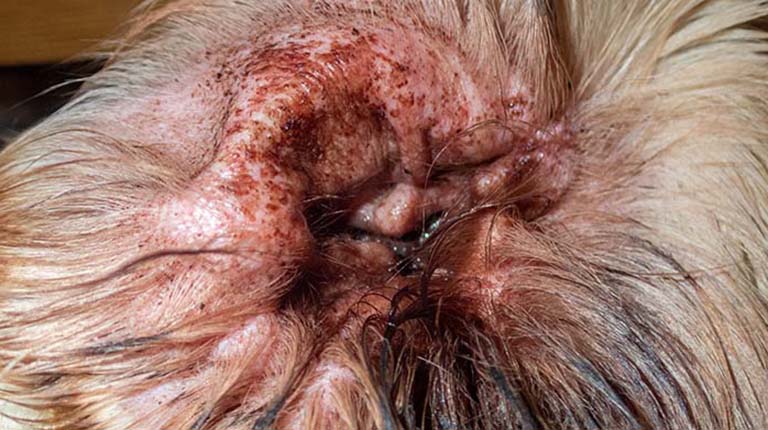
2. Ear Mites in Dogs
Ear mites are a common problem, especially in puppies or dogs exposed to other animals. These tiny parasites cause intense itching and dark, crumbly discharge, often giving the ears a strong odor.
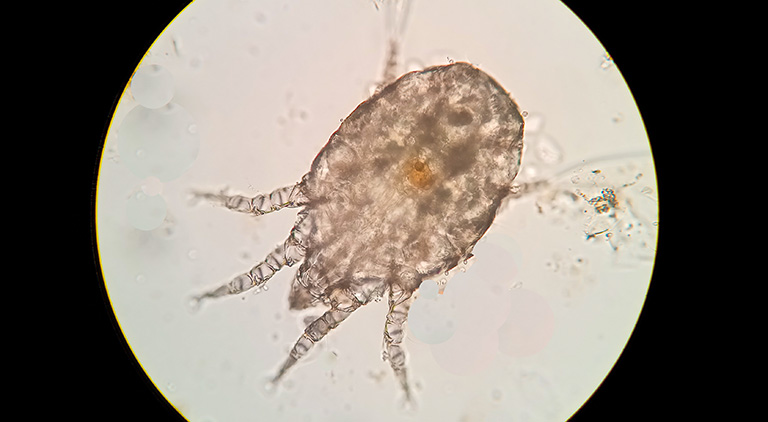
3. Allergies
Dogs with allergies frequently experience ear issues, including foul-smelling infections. Allergies can make the ears itchy, leading to excessive scratching, inflammation and secondary infections
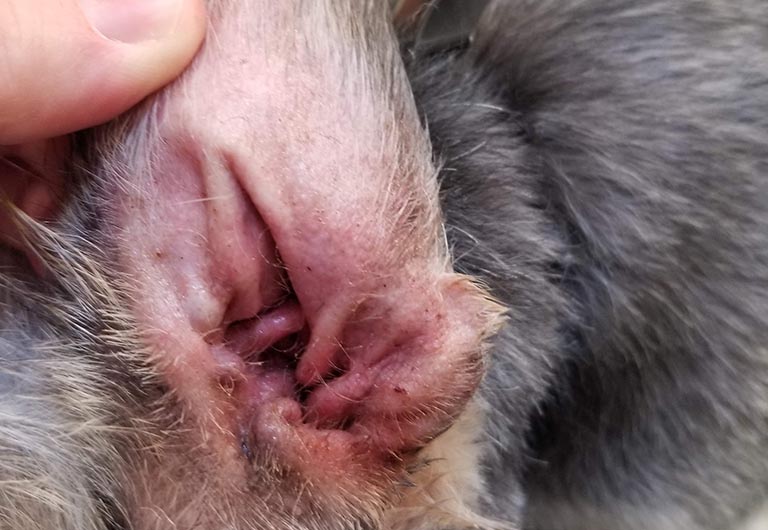
4. Excess Ear Wax
Some dogs naturally produce more ear wax than others. While a small amount is normal, an overproduction of wax can trap dirt and moisture, leading to a mild, unpleasant odor.
5. Hormonal Imbalances
Conditions like hypothyroidism or hyperadrenocorticism (Cushing’s disease) can make dogs more prone to recurring ear infections, which often result in smelly ears.
Breeds Prone to Ear Odors
Breeds with floppy ears or excessive hair in the ear canal are more prone to developing smelly ears due to the way their ear structure traps moisture, debris and bacteria. For example, cocker spaniels, basset hounds and beagles have long, pendulous ears that can restrict airflow, creating a warm, damp environment where yeast and bacteria can thrive. Poodles and Schnauzers, on the other hand, often have excess hair inside their ear canals, which can trap wax and dirt, leading to odor and infection. Regular cleaning and grooming are especially important for these breeds to prevent issues and maintain healthy ears.

Preventive Care Tips for Stinking Dog Ears
How to Clean Dog Ears
Regular ear cleaning is key to preventing smelly ears and maintaining a dog’s ear health. It’s important to use vet-approved ear cleaning solutions specifically designed for dogs, as these are formulated to gently remove wax and debris without irritating the ear canal. Owners should avoid using cotton swabs deep in the ear canal to prevent damage and instead focus on wiping the outer ear. Depending on your dog’s breed, regular cleaning may be needed weekly or bi-weekly to prevent buildup that can lead to infections and odor.
If you’re unsure or nervous about cleaning your dog’s ears, it’s best to take them to the vet for a professional cleaning or visit your local groomer. At Smoochie Pooch, ear cleaning is a standard part of our grooming packages, ensuring your dog’s ears are cleaned safely and effectively by experienced professionals.
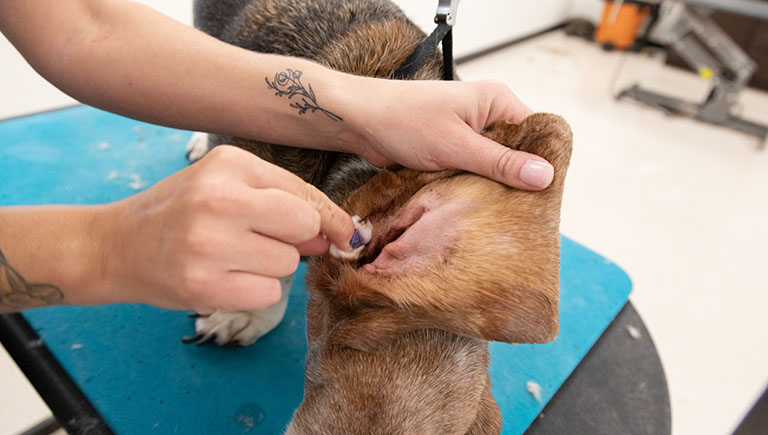
Drying Ears after Swimming or Bathing
Drying a dog’s ears thoroughly after swimming or bathing is just as critical. Moisture trapped in the ear canal can create the perfect breeding ground for bacteria and yeast, leading to infections and unpleasant smells. This simple step can significantly reduce the risk of ear problems in dogs who are frequent swimmers or regularly bathed.
Dietary Considerations to Help Prevent Smelly Dog Ears
Diet also plays a role in a dog’s ear and skin health. A balanced diet rich in essential fatty acids, like omega-3s, can help reduce inflammation and support overall skin health, which includes the ears. Dogs with food allergies may experience chronic ear infections as a symptom of their sensitivity, so identifying and managing any dietary triggers can prevent recurring ear issues. Working with your vet to choose the right food can improve your dog’s ear health and reduce the risk of smelly ears caused by underlying allergies.
When to Visit a Veterinarian for Dog Stinky Ears
It’s important to know when smelly ears go beyond a simple cleaning issue and require a visit to the veterinarian. If your dog’s ears have a persistent foul odor that doesn’t improve with routine cleaning, it could be a sign of a more serious infection or underlying health issue. Other red flags include discharge from the ears, which may appear as a yellow, brown or bloody substance, and visible redness or swelling inside the ear canal. These symptoms often indicate bacterial or yeast infections that require medical treatment to prevent complications.
Additionally, if your dog shows signs of pain or discomfort—such as frequently scratching at their ears, shaking their head or whining when their ears are touched—it’s time for professional attention. Dogs may also tilt their head or lose balance if the infection has progressed, signaling a more severe problem like an inner ear infection. Prompt veterinary care is crucial in these cases to prevent long-term damage and relieve your dog’s discomfort.
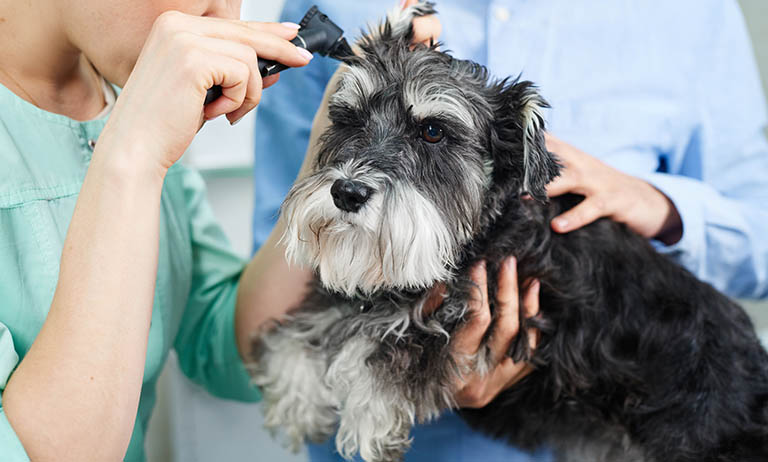
Minimize the Chances of Stinky Dog Ears
Maintaining your dog’s ear health is essential for preventing infections and avoiding unpleasant odors. By establishing a regular cleaning routine, drying their ears after water exposure, and ensuring their diet supports healthy skin and ears, you can help keep their ears in good condition. However, if the smell persists or you notice signs of discomfort, it’s crucial to consult your veterinarian for a proper diagnosis and treatment plan. With the right care and attention, you can protect your dog from ear problems and keep them feeling their best.


